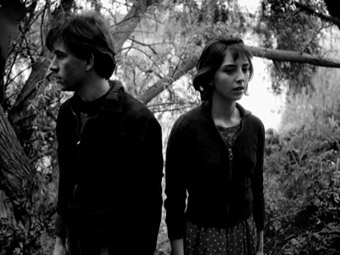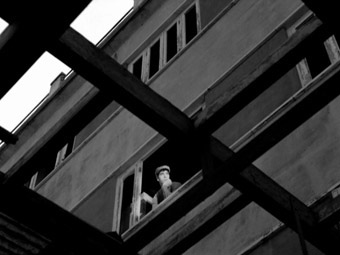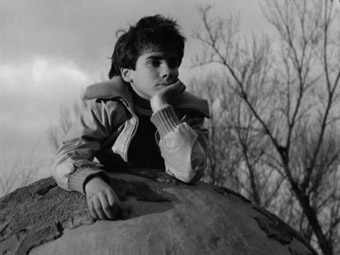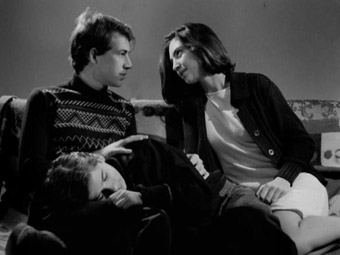"Love, all love always implies some kind of betrayal." |
João Bénard da Costa |
Though Pedro Costa has received international acclaim for his later features, the cross-genre fiction and documentary hybrids Ossos/Bones and No Quarto da Vanda/In Vanda's Room, his earlier fiction films are less well known outside of his native Portugal, until now. For the seasoned, dare I say professional cinephile, Costa's debut feature, O'Sangue/Blood, will feel wonderfully familiar, like an old friend, who's come back to your after a lengthy absence from your life. As a route into his work, you can find no better. It's like a lovely little guiding hand, saying, "look, you've seen things like me before, I'm not so different ... keep watching," and you immediately settle, no longer worried about what you might come across, letting the narrative unfold and wash over you.
Its opening frames will fire off memories and images of other directors and other films that you've seen over the years, but let me be clear, this is no clever, knowing shtick constructed to make people who understand the references feel ever more superior (yes, Quentin, I'm looking at you). There is much more to the look and feel of Blood than a tired pastiche of all that's gone before. Costa doesn't simply reference other cinematic greats – think Robert Bresson crossed with Maurice Tourneur, added to a side of Nicholas Ray, topped with a final twist of Wim Wenders thanks to the cinematography work of his long time collaborator Martin Schãfer – he changes them and reinterprets them in a way that has more in common with Jean-Luc Godard or Emir Kusturica than with the aforementioned Mr. Tarantino (for those interested in this area, Adrian Martin's essay included in the accompanying booklet will be a real treat, more on that in extra features section below).

Pedro Costa is clearly a man who is in love with his art; lives, eats, sleeps breathes it, and that care and attention shows itself loud and clear on screen.
Of course, picking up on the references is a fun game, and probably one you've played more than once, but it rather spoils the experience of a film, since you're thinking more about what something looks like and how it's constructed, rather than how it makes you feel, so you lose something in return. The film becomes heartless and soulless – a criticism so often levelled at modern cinema. In essence, because we can never experience something anew, we can never be like the audiences who sat in slack-jawed awe at the pioneering films of the art form's formative years. But, what if that postmodern reflex to reference actually gave a fresher, deeper meaning to the narrative we see on screen, making us feel just like those audience goers, because you can't quite fathom where this film has been all your life, and you know you'll probably never see the like of it again.
This is the experience of watching Blood.
The story of Vicente (Pedro Hestnes) his ten-year-old brother Nino (Nuno Ferreira), and their close bond with local girl Clara (Inês de Medeiros), plays like a fable and a tragic fable at that. Gravely ill, their father (Canto e Castro) is consistently absent, leaving the boys to fend for themselves when he travels to get treatment. In the wake of their father's death, Vicente is left to pick up the pieces and protect his brother from the truth. Keeping creditors at bay, he struggles with his uncle (Luís Miguel Cintra) to keep the family unit together, and the two boys eventually end up separated, with Nino living across town with his young cousin, Pedro (Miguel Fernandes). Nino holds onto the hope that Vicente will return, and they will be reunited with Clara as a family once more.
Though I've described the film as a somewhat gentle, beautiful affair, that's not quite true, for everything that's beautiful, and dazzling here – it's hard to believe this film is twenty years old – there always feels like there's something lurking, just underneath the surface, in the same way you wonder what's lying in wait beyond the flat surface of a deep pond; or peer into the darkness under your bed, waiting for a pair of eyes to blink back or an arm to shoot out at you. Part dream, part nightmare or perhaps a strange combination of the two, the narrative weaves in and out, leaving us unsure of time and space apart from the references the characters make to Christmas and New Years Eve. Costa's film is a puzzle. We're never really sure if what we see and hear is happening at the same time as, or bears any relation to what we've seen previously.

Perhaps most alarmingly of all is the concern whether we'll see any of the characters again once they leave the frame. Nino constantly asks when his father will return, and it's a fear that transfers onto us. A prime and startling example is the film's opening sequence, which sees Vicente and his father sharing a tense goodbye as he leaves for treatment. The camera stays in close up, on Vicente's troubled face, when out of nowhere – quite literally breaking the sacred one hundred and eighty degree rule – his father slaps him across the face, cutting to a reverse angle close up of a mysterious figure, which we will ultimately come to learn is Vicente and Nino's father.
In these early minutes, Costa certainly makes an impact. It's quite appropriate that after a fair few seconds of blackness – always a bold move, in my opinion, there's nothing that elongates time more than looking at a black screen – with a narrative event that's the equivalent of the finale of a fireworks show. It's no stretch to say it almost feels like you're the one that's been hit, especially when the immediate aftermath of it puts us very much in Vicente's shoes. The intrigue of it all draws you in, and trying to decipher what everything that moment might mean, and equally, of all the other moments which follow it – since, that's what it feels like, moments, vignettes, of course there is shape to events in a vague way, but not in the concrete sense - and what happens next will keep you watching, even before you have become engrossed in the narrative of the brothers struggle.
If you're after a film that ticks nicely along in linear fashion from A to Z, making twenty-six stops at neat intervals in between, then Blood isn't for you. It doesn't take time to explain and elaborate and it certainly doesn't make things easy to follow. Arguably, this could just be Costa pulling off the classic first-time filmmaker trick of eliding plot details, just to look clever and interesting. But, I don't think that's a fair or true assessment. The less than standard approach to narrative construction really does add to the overall feel of the film.

On looks alone, Blood ticks the interesting and clever box, with some truly breathtaking examples of play with light and shade as well as shape and space. The nights are inky, relentless, velveteen black, and the days are piercingly, gleaming white, sometimes the contrasts are so sharp it's almost painful, but presumably, that's the point. At times, it feels so vivid and rich, that to describe it as black and white feels like a disservice. The depth of light, shade and everything between those two places has shows us a depth of colour, rather than pointing to the lack of it. But, rather than feeling like an arbitrary, happy accident, everything in Blood feels composed, with an almost painterly impulse. You could play this film in still slideshow, frame-by-frame, and it would still resonate in exactly the same way. Costa finds beauty in the unlikeliest places, whether in the eerily woodlands with their tall gnarled trees, giant, soulless apartment buildings or towering scaffold structures, bisecting the frame into progressively smaller pieces. Everything is up for experimentation, right down to sounds and textures. There's a real sense that Costa is searching out opportunities to explore and test the limits of his locations as well as the medium he's working with.
There's a grittiness and an earthiness Blood, which that belies the odd sense of magic and wonder that permeates every frame. From the moment we set eyes on little Nino, it's hard not to think of one of the most famous children in cinema history, Bruno in Vittorio De Sica's Ladri di biciclette/Bicycle Thieves. It's equally difficult to not to see echoes of film's other famous child, Antoine of Les quatre cents coups/The 400 Blows, in the lone, solemn figure of Vicente, walking the streets. While it might feel like I'm playing Adrian Martin's game of 'spot the shot' here, I don't think such comparisons are purely aesthetic ones. All these children are innocent and inquisitive, yet they've been changed, their futures curtailed by the realities of the real world. Deep down, perhaps Vicente and Nino already know their dream of a stable home with a loving family inside will never come to fruition, just as Bruno had to watch his father be evermore degraded by circumstance and Antoine was destined to be unloved and alone.
These are damaged boys. While Truffaut and De Sica leave to gather this knowledge for ourselves, the brothers in Blood are already painfully aware of their position. Vicente's uncle too, seems to acknowledge this, when he tells Nino that his brother is sick. Sickness, in varying degrees, pervades the film, whether though their father's terminal illness, Nino's ailments as a young child, Vicente's feverish dreams or their cousin Pedro's disability. Essentially, they've already been damaged; perhaps irrevocably by the rough hand they've been dealt.

The brothers constantly struggle to survive on their own. Effectively orphaned by circumstance, they make their own family, aided by Clara – who is both a maternal and romantic figure, sometimes both. The tension between the three of them hangs over the film like a dark foreboding cloud. Just as her role within the boys lives seems to shift – one moment she'll be cutting Nino's hair, and the next she'll be perilously close to crossing the line with Vicente, finally giving into temptation and kissing him – her affect on them changes too. In the early part of the film, she's the force that binds them, keeping the house clean and making sure they're both looked after. But later, when her romantic feelings towards Vicente have clearly grown, she's the thing that divides them. While she and Vicente are out at the fairground, Nino is home alone, leaving their uncle with an open opportunity to spirit the boy away in the night, undetected.
As with everything else in Costa's film, all is not as straightforward as it seems, and the characterisation of Clara is no exception. Far from embodying the classic Madonna/whore dialectic, she's fittingly unclassifiable. Unlike the boys, who are very much rooted within the boundaries of the film, Clara remains curiously untethered to the real world. Instead, she floats in and out, appearing disappearing, she's part fantasy figure, part fairy godmother who always seems to know when she's needed and why, ostensibly steering the narrative through her actions. Given that Blood poses questions rather than providing answers, it's particularly appropriate that she remains an enigma. Like all the best fantasies, and all the best dreams, their beauty is ruined and their power is diminished when you try to apply truth or logic to them. Perhaps then, the only way we can understand Blood is to look at and appreciate it.
This is a landmark piece and a truly transnational film, drawing together the often opposing factions of world cinema with disarming ease to create something completely unique. It says nothing about what it is to be Portuguese, and reflects little of that culture. The only marker of identity is the language in which they speak. However, this is by no means a criticism of Costa or Blood, there is no betrayal of culture, no sell out to conform and make the film more accessible, crossing over to a wider audience – undoubtedly the air of familiarity does achieve this to some degree. Blood is a film more concerned with the universal, with the doing and the saying of living, with our emotional connections to the world and all the citizens within it. Rarely has that world looked so strange, so dazzling or so beautiful.
Framed in its original ratio of 1.33:1, this is a consistently impressive transfer whose punchy contrast is never achieved at the expense of the tonal range or the detail in shadows and highlights. Detail at best is crisp without artificial enhancement, and a richness of tone comparable to cinematographer Gábor Medvigy's work for Béla Tarr or Herbert Cardwell and Frederick Elmes' for Eraserhead. Grain is hardly visible and there are no compression artefacts and hardly a dust spot to be seen.

The mono 2.0 soundtrack scores on clarity and is richer on the background atmospherics than many such tracks. Dialogue is a little clipped in places, but not enough to get concerned about.
João Bénard da Costa on 'O Sangue' (16:18)
This one is a change from the usual portrait style features common to Second Run releases, and it's certainly different from the cheesy, unintentionally amusing introductions found on other discs, which close with the film's director or a lead actor beaming into the camera. Instead, this is an appreciation in the genuine sense, a relatively short, but incredibly passionate and appropriately poetic, reflection on the film by the late Professor João Bénard da Costa, renowned author and Director of the Portuguese Cinematheque, where he discusses his favourite scenes from Blood interspersed with clips to illustrate his points. A must watch, and a lovely bookend between viewings, if this man can't convince you to watch this film, nothing will.
Photo Gallery (2:06)
A slideshow of production stills and behind-the-scenes images set to the sound of the folk song/lullaby we hear during the film's title sequence. It's a nice little thing, which really shows off the beauty in Blood's shot composition.
Booklet
I've said elsewhere that I'm a particular fan of these kinds of booklets, and I particularly enjoyed the writings in this one. Along with the usual production credits and some nice still reproductions, this one contains not one, but two essays on the feature, which deal with Blood and appreciation of it, from two different perspectives.
The first, 'The Inner Life of a Film,' written by Adrian Martin (academic and co-editor of the film journal Rouge), approaches the film with a philosophical slant, exploring in some detail the film's visual references and aesthetic, alongside the director's other work. This is a particularly fascinating read for anyone with an interest in close analysis or postmodern theory. The second piece, 'Fatal Beauty,' authored by Frédéric Bonnaud, (radio host and journalist for Parisian culture magazine, Les Inrockuptibles), takes a more socio-historical approach, fleshing out the details of Blood's production and narrative, using the same level of analytical detail as Martin, and is another great accessible read. Both essays work well as standalone pieces, but are also great companions, acting like the two sides of a coin, giving a well-rounded picture of the film, whether you're coming to it fresh or with a greater depth of knowledge.
Also included is a Second Run release catalogue, which remains unchanged from the one included in their previous release of Márta Mészáros' Diary for My Children.
Currently, Blood is the only Pedro Costa film available in the UK, or for that matter, North America. Second Run have turned out another great, high quality release, and should certainly take a moment to congratulate themselves on not only beating fellow labels to the punch by getting this package to market first, but also being the driving force behind introducing Costa's work to a wider audience. To that end, both Criterion and Eureka's Master's of Cinema series have subsequent Costa films planned for release (Criterion have a box set of Ossos, In Vanda's Room, and Colossal Youth pencilled in for early next year, while Eureka has slated the latter two titles for separate releases in the near future).
For the ardent collectors amongst you, the kudos of getting something first – there's nothing quite like it – might be the initial catalyst for parting with your hard-earned cash, but Costa's debut is really something quite special. Blood is a beautifully shot film which is even more beautiful to look at thanks to the first-rate transfer – and is more than deserving of the extra attention it will undoubtedly garner. An essential purchase.
|